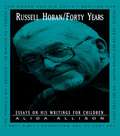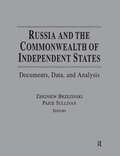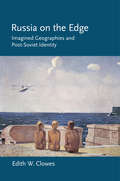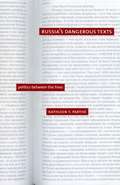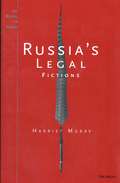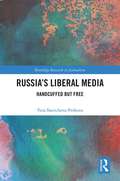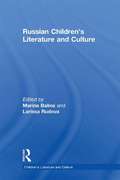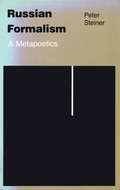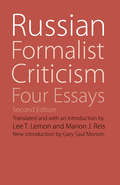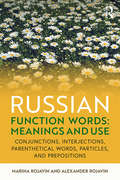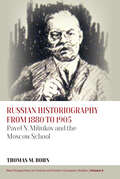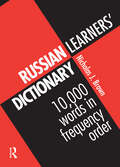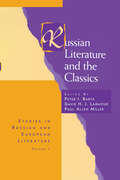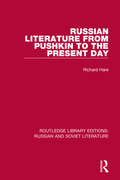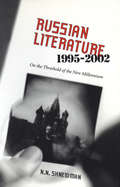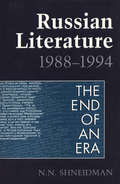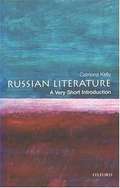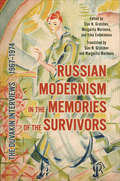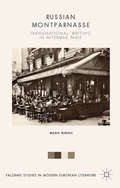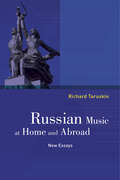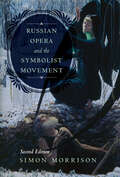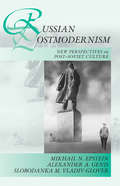- Table View
- List View
Russell Hoban/Forty Years: Essays on His Writings for Children (Children's Literature and Culture #Vol. 2214)
by Alida AllisonFirst Published in 2000. Routledge is an imprint of Taylor & Francis, an informa company.
Russia and the Commonwealth of Independent States: Documents, Data, and Analysis
by Zbigniew K BrzezinskiThis work brings together major accords and protocols that form the institutional framework of the Commonwealth of Independent States (CIS); a selection of policy statements by the leaders of CIS countries; a chronological record of political, economic and military security developments and major crises in CIS "hot spots"; and statistics and country profiles.
Russia on the Edge: Imagined Geographies and Post-Soviet Identity
by Edith W. ClowesSince the dissolution of the Soviet Union in 1991, Russians have confronted a major crisis of identity. Soviet ideology rested on a belief in historical progress, but the post-Soviet imagination has obsessed over territory. Indeed, geographical metaphors—whether axes of north vs. south or geopolitical images of center, periphery, and border—have become the signs of a different sense of self and the signposts of a new debate about Russian identity. In Russia on the Edge Edith W. Clowes argues that refurbished geographical metaphors and imagined geographies provide a useful perspective for examining post-Soviet debates about what it means to be Russian today.Clowes lays out several sides of the debate. She takes as a backdrop the strong criticism of Soviet Moscow and its self-image as uncontested global hub by major contemporary writers, among them Tatyana Tolstaya and Viktor Pelevin. The most vocal, visible, and colorful rightist ideologue, Aleksandr Dugin, the founder of neo-Eurasianism, has articulated positions contested by such writers and thinkers as Mikhail Ryklin, Liudmila Ulitskaia, and Anna Politkovskaia, whose works call for a new civility in a genuinely pluralistic Russia. Dugin’s extreme views and their many responses—in fiction, film, philosophy, and documentary journalism—form the body of this book.In Russia on the Edge literary and cultural critics will find the keys to a vital post-Soviet writing culture. For intellectual historians, cultural geographers, and political scientists the book is a guide to the variety of post-Soviet efforts to envision new forms of social life, even as a reconstructed authoritarianism has taken hold. The book introduces nonspecialist readers to some of the most creative and provocative of present-day Russia’s writers and public intellectuals.
Russia's Dangerous Texts: Politics between the Lines
by Kathleen F. ParthéRussia's Dangerous Texts examines the ways that writers and their works unnerved and irritated Russia's authoritarian rulers both before and after the Revolution. Kathleen F. Parthé identifies ten historically powerful beliefs about literature and politics in Russia, which include a view of the artistic text as national territory, and the belief that writers must avoid all contact with the state. Parthé offers a compelling analysis of the power of Russian literature to shape national identity despite sustained efforts to silence authors deemed subversive. No amount of repression could prevent the production, distribution, and discussion of texts outside official channels. Along with tragic stories of lost manuscripts and persecuted writers, there is ample evidence of an unbroken thread of political discourse through art. The book concludes with a consideration of the impact of two centuries of dangerous texts on post-Soviet Russia.
Russia's Legal Fictions
by Harriet MuravLegal scholars and literary critics have shown the significance of storytelling, not only as part of the courtroom procedure, but as part of the very foundation of law. Russia's Legal Fictions examines the relationship between law, narrative and authority in nineteenth- and twentieth-century Russia. The conflict between the Russian writer and the law is a well-known feature of Russian literary life in the past two centuries. With one exception, the authors discussed in this book--Sukhovo-Kobylin, Akhsharumov, Suvorin, and Dostoevsky in the nineteenth century and Solzhenitsyn and Siniavskii in the twentieth--were all put on trial. In Russia's Legal Fictions, Harriet Murav starts with the authors' own writings about their experience with law and explores the history of these Russian literary trials, including censorship, libel cases, and one case of murder, in their specific historical context, showing how particular aspects of the culture of the time relate to the case. The book explores the specifically Russian literary and political conditions in which writers claim the authority not only as the authors of fiction but as lawgivers in the realm of the real, and in which the government turns to the realm of the literary to exercise its power. The author uses specific aspects of Russian culture, history and literature to consider broader theoretical questions about the relationship between law, narrative, and authority. Murav offers a history of the reception of the jury trial and the development of a professional bar in late Imperial Russia as well as an exploration of theories of criminality, sexuality, punishment, and rehabilitation in Imperial and Soviet Russia.
Russia's Liberal Media: Handcuffed but Free (Routledge Research in Journalism)
by Vera Slavtcheva-PetkovaThis book examines the challenges and pressures liberal journalists face in Putin's Russia. It presents the findings of an in-depth qualitative study, which included ethnographic observations of editorial meetings during the conflict in Ukraine. It also provides a theoretical framework for evaluating the Russian media system and a historical overview of the development of liberal media in the country. The book focuses on some of Russia’s most influential liberal national news outlets: "the deadliest" newspaper Novaya Gazeta, "Russia’s last independent radio station" Radio Echo of Moscow (Ekho Moskvy) and US Congress-funded Radio Free Europe/Radio Liberty. The fieldwork included ethnographic observations of editorial meetings, long interviews with editors and journalists as well as documentary analysis. The monograph makes theoretical contributions to three main areas: 1. Media systems and terms of reference. 2. Journalism: cultures, role conceptions, and relationship with power, culture and society. 3. Mediatisation of conflict and nationhood.
Russian Bible Wars
by Stephen K. BataldenAlthough biblical texts were known in Church Slavonic as early as the ninth century, translation of the Bible into Russian came about only in the nineteenth century. Modern scriptural translation generated major religious and cultural conflict within the Russian Orthodox church. The resulting divisions left church authority particularly vulnerable to political pressures exerted upon it in the twentieth century. Russian Bible Wars illuminates the fundamental issues of authority that have divided modern Russian religious culture. Set within the theoretical debate over secularization, the volume clarifies why the Russian Bible was issued relatively late and amidst great controversy. Stephen Batalden's study traces the development of biblical translation into Russian and of the 'Bible wars' that then occurred in the nineteenth and twentieth centuries in Russia. The annotated bibliography of the Russian Bible identifies the different editions and their publication history.
Russian Children's Literature and Culture (Children's Literature and Culture)
by Marina Balina Larissa RudovaSoviet literature in general and Soviet children’s literature in particular have often been labeled by Western and post-Soviet Russian scholars and critics as propaganda. Below the surface, however, Soviet children’s literature and culture allowed its creators greater experimental and creative freedom than did the socialist realist culture for adults. This volume explores the importance of children’s culture, from literature to comics to theater to film, in the formation of Soviet social identity and in connection with broader Russian culture, history, and society.
Russian Formalism: A Metapoetics
by Peter SteinerRussian Formalism, one of the twentieth century's most important movements in literary criticism, has received far less attention than most of its rivals. Examining Formalism in light of more recent developments in literary theory, Peter Steiner here offers the most comprehensive critique of Formalism to date. Steiner studies the work of the Formalists in terms of the major tropes that characterized their thought. He first considers those theorists who viewed a literary work as a mechanism, an organism, or a system. He then turns to those who sought to reduce literature to its most basic element—language—and who consequently replaced poetics with linguistics. Throughout, Steiner elucidates the basic principles of the Formalists and explores their contributions to the study of poetics, literary history, the theory of literary genre, and prosody. Russian Formalism is an authoritative introduction to the movement that was a major precursor of contemporary critical thought.
Russian Formalist Criticism: Four Essays, Second Edition (Regents Critics)
by Gary Saul Morson Lee T. Lemon Marion J. ReisThe Russian formalists emerged from the Russian Revolution with ideas about the independence of literature. They enjoyed that independence until Stalin shut them down. By then, however, they had produced essays that remain among the best defenses ever written for both literature and its theory. Included here are four essays representing key points in the formalists’ short history. Victor Shklovsky’s pioneering “Art as Technique” (1917) defines the literary as a way to make us see familiar things as if for the first time. His 1921 essay on Tristram Shandy makes that eccentric novel the centerpiece for a theory of narrative. A section from Boris Tomashevsky’s “Thematics” (1925) inventories the elements of stories. In “The Theory of the ‘Formal Method’” (1927), Boris Eichenbaum defends Russian Formalism against various attacks. An able champion, he describes Formalism’s evolution, notes its major figures and works, clears away decayed axioms, and rescues literature from “primitive historicism” and other dangers. These essays set a course for literary studies that led to Prague structuralism, French semiotics, and postmodern poetics. Russian Formalist Criticism has been honored as a Choice Outstanding Academic Book of the Year by the American Library Association.
Russian Function Words: Conjunctions, Interjections, Parenthetical Words, Particles, and Prepositions
by Marina Rojavin Alexander RojavinRussian Function Words: Meanings and Use is a collection of 463 prepositions, conjunctions, particles, interjections, and parenthetical words. This book provides a semantic, syntactic, and stylistic analysis of each word, accompanying the explanation with examples of the word’s usage in discourse in contemporary, everyday Russian and analogous translations into English. Consequently, it allows users to develop an understanding of contemporary grammatical, lexical, and stylistic norms, with the aim of mastering these critical words. This book also includes a multitude of idioms and sayings that users will learn to use in the appropriate context. Intermediate and advanced students, instructors, and translators will find this a useful supplement to their existing resources. It also serves as a helpful reference for independent learners at all levels.
Russian Historiography from 1880 to 1905: Pavel N. Miliukov and the Moscow School (New Perspectives on Central and Eastern European Studies #6)
by Thomas M. BohnIn Russian historiography, the Moscow School’s paradigm shift from political and legal history to social and economic history was markedly driven by Pavel Miliukov (1859-1943), the late leader of the Constitutional Democrats and foreign minister of the Provisional Government. Russian Historiography from 1880 to 1905 develops a narrative of historical sociology’s advancement through the Moscow School under Miliukov’s influence and provides a window into his decision making as a political figure who based his leadership not on public opinion but on the effectiveness of historical processes.
Russian Learners' Dictionary: 10,000 Russian Words in Frequency Order
by Nicholas BrownThis dictionary contains 10,000 Russian words in order of importance starting with the most common and finishing with words that occur about 8 times in a million. All the words have English translations, many have examples of usage and the entries include information on stress and grammatical irregularities. There is also a complete alphabetical index to the words in the list.A learner who knows all or most of these 10,000 words can be regarded as competent in Russian for all normal purposes. The list takes you from a beginner's core vocabulary through to postgraduate level.
Russian Learners' Dictionary: 10,000 Russian Words in Frequency Order
by Nicholas BrownThis dictionary contains 10,000 Russian words in order of importance starting with the most common and finishing with words that occur about 8 times in a million. All the words have English translations, many have examples of usage and the entries include information on stress and grammatical irregularities. There is also a complete alphabetical index to the words in the list.A learner who knows all or most of these 10,000 words can be regarded as competent in Russian for all normal purposes. The list takes you from a beginner's core vocabulary through to postgraduate level.
Russian Literature Since 1991
by Evgeny DobrenkoRussian Literature since 1991 is the first comprehensive, single-volume compendium of modern scholarship on post-Soviet Russian literature. The volume encompasses broad, complex and diverse sources of literary material - from ideological and historical novels to experimental prose and poetry, from nonfiction to drama. Written by an international team of leading experts on contemporary Russian literature and culture, it presents a broad panorama of genres in post-Soviet literature such as postmodernism, magical historicism, hyper-naturalism (in drama), and the new lyricism. At the same time, it offers close readings of the most prominent works published in Russia since the end of the Soviet regime and elimination of censorship. The collection highlights the interdisciplinary context of twenty-first-century Russian literature and can be widely used both for research and teaching by specialists in and beyond Russian studies, including those in post-Cold War and post-communist world history, literary theory, comparative literature and cultural studies.
Russian Literature and the Classics (Routledge Harwood Studies in Russian and European Literature)
by Paul Allen Miller Peter I. Barta David H. J. LarmourRussian Literature and the Classics attempts to fill a gap. To date there has been no book-length, systematic study of the impact of antiquity on Russian literature and culture. While by no means claiming to offer a comprehensive approach, the authors focus on various aspects of the influence which the Classics have had on Russian literature at particularly significant junctures - the beginning of the nineteenth century; the age of the great Russian realist novel; the "Silver Age"; Stalin's terror; the "Thaw" after 1956; and the period just before the collapse of Soviet society. In their introductory essay the editors offer an overview of the Classical Tradition. In it, they provide an insight into the contrasting ways in which that tradition manifested itself in the literatures of Western Europe and of Russia.
Russian Literature from Pushkin to the Present Day (Routledge Library Editions: Russian and Soviet Literature #12)
by Richard HareThis book, first published in 1947, examines the truly vital and enduring qualities of the leading Russian writers, as literature and as interesting documents of phases of Russian history. This is one of the most striking features of Russian literature since Pushkin – it treated artistically social and political issues that in the more prosperous and stable Western world were dealt with through journalism, mainly. This book analyses Russian literature’s propensity for providing reassurance and guidance to withstand the harsher elements of Russian society by examining some of its leading writers.
Russian Literature, 1995-2002
by Norman N. ShneidmanWriters have a difficult time making a living in contemporary Russia. Market-driven publishing companies have pushed serious domestic prose to the fringes of their output and few people have money to buy books. The disintegration of the Soviet Union in 1991 led Russian society to become polarized between an increasingly prosperous minority and a very poor majority. This divide is also mirrored within the writing community, with some writers supporting conservative, nationalist pro-Soviet thinking, and others, liberal, democratic, pro-Western thought.N.N. Shneidman, in the tradition of his previous volumes ? Soviet Literature in the 1970s; Soviet Literature in the 1980s; Russian Literature, 1988?1994 ? investigates the Russian literary scene with special emphasis on the relationship between thematic substance and the artistic quality of recently published prose. Despite the many challenges besetting it, Shneidman argues convincingly that literary activity in Russia continues to be dynamic and vibrant. The future development of Russian literature may depend on general economic, political, and social factors, but a new generation of talented writers is fast moving past older forms of ideology and embracing new ways of thinking about Russia.
Russian Literature: 1988-1994
by Norman N. ShneidmanThe collapse of the Soviet Union brought about radical changes in the Russian literary world. With the state's relinquishment of control over literary production, writers acquired freedom of expression and publication. State publishing houses, now self-supporting enterprises, stopped printing money-losing books and turned to foreign detective novels and erotic literature, effecting a considerable shift in popular taste. The writer, no longer a producer of ideology, has been recast as a struggling competitor in a free-market environment. Focusing on the current Russian literary scene, Russian Literature, 1988-1994 examines these recent changes. Beginning with a general overview of the political, intellectual, and social atmosphere in the country and its effect on artistic creativity, Shneidman surveys the period's literature. He considers the work of succeeding generations of prose fiction writers: the 'old guard,' the writers of the intermediate generation, and the younger authors of perestroika, whose works first appeared in print after Gorbachev's ascent to power. The writing of this last group is divided into three categories: novels written in the style of conventional Russian realism; works that combine realistic prose with modernist narrative techniques; and the body of work that constitutes Russian post-modernism. Exploring artistic and social issues in an integrated manner, the volume will be of interest not only to students of Russian literature but also to those concerned with the culture and social life of the former Soviet Union.
Russian Literature: A Very Short Introduction
by Catriona KellyRather than presenting a conventional chronology of Russian literature, this book explores the place and importance in Russian culture of all types of literature. How and when did a Russian national literature come into being? What shaped its creation? How have the Russians regarded their literary language? The book uses the figure of Pushkin--'the Russian Shakespeare'--as a recurring example, as his work influenced every Russian writer who came after him, whether they wrote prose or verse. It furthermore examines why Russian writers are venerated, how they've been interpreted inside Russia and beyond, and the influences of the folk tale tradition, orthodox religion, and the West.
Russian Modernism in the Memories of the Survivors: The Duvakin Interviews, 1967–1974
by Margarita Marinova Slav N. GratchevIn the late 1960s and early 1970s, Soviet philologist, literary dissident, and university professor Viktor Duvakin made it his mission to interview the members of the artistic avant-garde who had survived the Russian Revolution, Stalin’s purges, and the Second World War. Based on archival materials held at the Moscow State University Library, Russian Modernism in the Memories of the Survivors catalogues six interviews conducted by Duvakin. The interviewees talk about their most intimate life experiences and give personal accounts of their interactions with famous writers and artists such as Vsevolod Meyerhold, Sergei Eisenstein, and Marina Tsvetaeva. They offer insights into the world of Russian emigrants in Prague and Paris, the uprising against the Communist government, what it was like to work at the United Nations after the Second World War, and other important aspects of life in the Soviet Union and Europe during the first half of the twentieth century. Archival photographs, as well as hundreds of annotations to the text, are included to help readers understand the historical and cultural context of the interviews. The unique and previously unpublished materials in Russian Modernism in the Memories of the Survivors will be of great interest to anyone who wants to learn more about this fascinating period in Soviet history.
Russian Montparnasse: Transnational Writing in Interwar Paris (Palgrave Studies in Modern European Literature)
by Maria RubinsThis book reassesses the role of Russian Montparnasse writers in the articulation of transnational modernism generated by exile. Examining their production from a comparative perspective, it demonstrates that their response to urban modernity transcended the Russian master narrative and resonated with broader aesthetic trends in interwar Europe.
Russian Music at Home and Abroad: New Essays
by Richard TaruskinThis new collection views Russian music through the Greek triad of "the Good, the True, and the Beautiful" to investigate how the idea of "nation" embeds itself in the public discourse about music and other arts with results at times invigorating, at times corrupting. In our divided, post–Cold War, and now post–9/11 world, Russian music, formerly a quiet corner on the margins of musicology, has become a site of noisy contention. Richard Taruskin assesses the political and cultural stakes that attach to it in the era of Pussy Riot and renewed international tensions, before turning to individual cases from the nineteenth century to the present. Much of the volume is devoted to the resolutely cosmopolitan but inveterately Russian Igor Stravinsky, one of the major forces in the music of the twentieth century and subject of particular interest to composers and music theorists all over the world. Taruskin here revisits him for the first time since the 1990s, when everything changed for Russia and its cultural products. Other essays are devoted to the cultural and social policies of the Soviet Union and their effect on the music produced there as those policies swung away from Communist internationalism to traditional Russian nationalism; to the musicians of the Russian postrevolutionary diaspora; and to the tension between the compelling artistic quality of works such as Stravinsky’s Sacre du Printemps or Prokofieff’s Zdravitsa and the antihumanistic or totalitarian messages they convey. Russian Music at Home and Abroad addresses these concerns in a personal and critical way, characteristically demonstrating Taruskin’s authority and ability to bring living history out of the shadows.
Russian Opera and the Symbolist Movement, Second Edition (California Studies In 20th-century Music Ser. #2)
by Simon MorrisonAcclaimed for treading new ground in operatic studies of the period, Simon Morrison’s influential and now-classic text explores music and the occult during the Russian Symbolist movement. Including previously unavailable archival materials about Prokofiev and Tchaikovsky, this wholly revised edition is both up to date and revelatory. Topics range from decadence to pantheism, musical devilry to narcotic-infused evocations of heaven, the influence of Wagner, and the significance of contemporaneous Russian literature. Symbolism tested boundaries and reached for extremes so as to imagine art uniting people, facilitating communion with nature, and ultimately transcending reality. Within this framework, Morrison examines four lesser-known works by canonical composers—Pyotr Tchaikovsky, Nikolay Rimsky-Korsakov, Alexander Scriabin, and Sergey Prokofiev—and in this new edition also considers Alexandre Gretchaninoff’s Sister Beatrice and Alexander Kastalsky’s Klara Milich, while also making the case for reviving Vladimir Rebikov’s The Christmas Tree.
Russian Postmodernism
by Mikhail N. Epstein Alexander A. Genis Slobodanka Millicent Vladiv-GloverRecent decades have been decisive for Russia not only politically but culturally as well. The end of the Cold War has enabled Russia to take part in the global rise and crystallization of postmodernism. This volume investigates the manifestations of this crucial trend in Russian fiction, poetry, art, and spirituality, demonstrating how Russian postmodernism is its own unique entity. It offers a point of departure and valuable guide to an area of contemporary literary-cultural studies insufficiently represented in English-language scholarship. This second edition includes additional essays on the topic and a new introduction examining the most recent developments.
